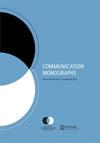数字化员工声音在集中式组织中促进积极变革和情感承诺的作用
IF 1.5
2区 文学
Q1 COMMUNICATION
引用次数: 20
摘要
摘要本研究调查了组织结构和沟通氛围对员工声音及其伴随结果的影响程度。鉴于数字技术的普遍使用,我们研究了两种不同类型的员工语音:可识别的当面语音和匿名的数字语音。研究结果表明:(a)组织集中与言论自由呈负相关;(b) 言论自由增加了员工在工作中和通过匿名社交媒体的发言权,(c)这两种类型的发言权都与组织变革有积极关系,从而增强了承诺。我们的研究通过(a)强调沟通环境的重要性和数字匿名语音的功效,以及(b)提出员工语音是一种包含内容、可识别性和模态的多维结构,从而推进了员工语音学术研究。本文章由计算机程序翻译,如有差异,请以英文原文为准。
The role of digitally-enabled employee voice in fostering positive change and affective commitment in centralized organizations
ABSTRACT This study investigated the extent to which organizational structure and communication climate influence employee voice and concomitant outcomes. Given the prevalent use of digital technologies, we examined two discrete types of employee voice: identifiable, in-person voice vs. anonymous, digitally-enabled voice. Findings demonstrated that (a) organizational centralization was negatively linked to freedom of speech; (b) freedom of speech increased employee voice both at work and through anonymous social media, and (c) both types of voice had positive relationships with organizational change, which subsequently enhanced commitment. Our study advances employee voice scholarship by (a) highlighting the significance of communication climate and the efficacy of digitally-enabled anonymous voice, and (b) proposing employee voice as a multidimensional construct that encompasses content, identifiability, and modality.
求助全文
通过发布文献求助,成功后即可免费获取论文全文。
去求助
来源期刊

Communication Monographs
COMMUNICATION-
CiteScore
5.40
自引率
0.00%
发文量
12
期刊介绍:
Communication Monographs, published in March, June, September & December, reports original, theoretically grounded research dealing with human symbolic exchange across the broad spectrum of interpersonal, group, organizational, cultural and mediated contexts in which such activities occur. The scholarship reflects diverse modes of inquiry and methodologies that bear on the ways in which communication is shaped and functions in human interaction. The journal endeavours to publish the highest quality communication social science manuscripts that are grounded theoretically. The manuscripts aim to expand, qualify or integrate existing theory or additionally advance new theory. The journal is not restricted to particular theoretical or methodological perspectives.
 求助内容:
求助内容: 应助结果提醒方式:
应助结果提醒方式:


